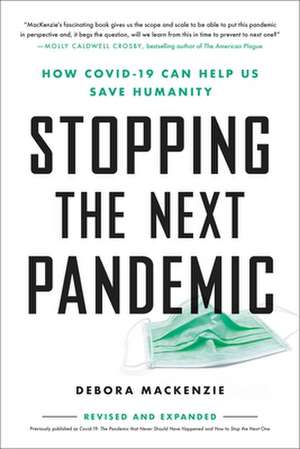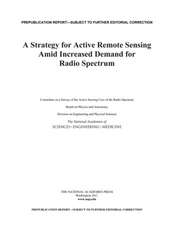Stopping the Next Pandemic
Autor Debora MacKenzieen Limba Engleză Paperback – 7 sep 2021
"MacKenzie's fascinating book gives us the scope and scale to be able to put this pandemic in perspective and, it begs the question, will we learn from this in time to prevent to next one?"--Molly Caldwell Crosby, bestselling author of The American Plague.*Named one of the Best Science Books of the Year by the Financial Times* The Covid-19 pandemic has left a trail of loss, misery, and economic ruin in its wake. With such destruction, can there be any silver lining? As veteran science journalist Debora MacKenzie illuminates in this captivating, acclaimed book, there is one: with the lessons learned from this disaster, we can stop it from happening again.
Here, in this fully revised and updated edition, she lays out the full story in accessible, gripping detail: the previous viruses that should have prepared us, the shocking public health failures that led to this catastrophe, the wrong decisions made at every turn. And employing what we have learned about viruses, vaccines, inequality, global cooperation, and more, she charts a bold, optimistic path forward for protecting humanity from threats to come. There is no question that more viruses are on the way, and we are still unprepared. But if we learn from our mistakes and heed the vision MacKenzie lays out in this book, we might avoid going through a nightmare like this - or worse - ever again.
| Toate formatele și edițiile | Preț | Express |
|---|---|---|
| Paperback (2) | 49.95 lei 3-5 săpt. | +26.82 lei 7-13 zile |
| Little Brown Book Group – 7 sep 2021 | 49.95 lei 3-5 săpt. | +26.82 lei 7-13 zile |
| Grand Central Publishing – 7 sep 2021 | 128.43 lei 3-5 săpt. | +13.97 lei 7-13 zile |
Preț: 128.43 lei
Nou
24.58€ • 25.51$ • 20.49£
Carte disponibilă
Livrare economică 01-15 martie
Livrare express 15-21 februarie pentru 23.96 lei
Specificații
ISBN-10: 0306924226
Pagini: 384
Dimensiuni: 142 x 208 x 30 mm
Greutate: 0.34 kg
Editura: Grand Central Publishing
Descriere
'Excellent . . . analyses clearly and authoritatively how the coronavirus pandemic played out, what governments should have done, and what we need to do when it happens again - as it undoubtedly will' Financial Times
'You could not hope for a better guide to the pandemic world order than Debora MacKenzie, who's been on this story from the start. This is an authoritative yet readable explanation of how this catastrophe happened - and more important, how it will happen again if we don't change'
Tim Harford, author of The Undercover Economist, Adapt and Messy
'This definitely deserves a read - the first of the post mortems by a writer who knows what she's talking about'
Laura Spinney, author of Pale Rider: The Spanish Flu of 1918 and How It Changed the World
In a gripping, accessible narrative, a veteran science journalist lays out the shocking story of how the COVID-19 coronavirus pandemic happened and how to make sure this never happens again
Over the last 30 years of epidemics and pandemics, we learned every lesson needed to stop this coronavirus outbreak in its tracks. We heeded almost none of them. The result is a pandemic on a scale never before seen in our lifetimes. In this captivating, authoritative, and eye-opening book, science journalist Debora MacKenzie lays out the full story of how and why it happened: the previous viruses that should have prepared us, the shocking public health failures that paved the way, the failure to contain the outbreak, and most importantly, what we must do to prevent future pandemics.
Debora MacKenzie has been reporting on emerging diseases for more than three decades, and she draws on that experience to explain how COVID-19 went from a potentially manageable outbreak to a global pandemic. Offering a compelling history of the most significant recent outbreaks, including SARS, MERS, H1N1, Zika, and Ebola, she gives a crash course in Epidemiology 101--how viruses spread and how pandemics end--and outlines the lessons we failed to learn from each past crisis. In vivid detail, she takes us through the arrival and spread of COVID-19, making clear the steps that governments knew they could have taken to prevent or at least prepare for this. Looking forward, MacKenzie makes a bold, optimistic argument: this pandemic might finally galvanize the world to take viruses seriously. Fighting this pandemic and preventing the next one will take political action of all kinds, globally, from governments, the scientific community, and individuals--but it is possible.
No one has yet brought together our knowledge of COVID-19 in a comprehensive, informative, and accessible way. But that story can already be told, and Debora MacKenzie's urgent telling is required reading for these times and beyond. It is too early to say where the COVID-19 pandemic will go, but it is past time to talk about what went wrong and how we can do better.




















